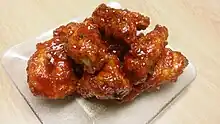| Yangnyeom chicken | |
 Yangnyeom chicken from BHC chicken franchise | |
| Korean name | |
|---|---|
| Hangul | 양념치킨 |
| Hanja | 藥念치킨 |
| Revised Romanization | Yangnyeom chikin |
| McCune–Reischauer | Yangnyŏm ch'ik'in |
| Alternate name | |
| Hangul | 양념통닭 |
| Revised Romanization | Yangnyeom tongdak |
| McCune–Reischauer | Yangnyŏm t'ongdak |
Yangnyeom chicken (Korean: 양념치킨) is a variety of Korean fried chicken seasoned with a sweet and spicy sauce of gochujang, garlic, sugar, and other spices.[1][2][3] It is often eaten as anju, food consumed while drinking, in South Korea.[3][4][5]
Julia Moskin, writing for The New York Times, called yangnyeom chicken "the apotheosis of the Korean style" of fried chicken.[6]
Etymology
The word chicken (치킨) in South Korea refers to fried chicken, and sometimes roasted chicken;[2] yangnyeom (양념) is Korean for "seasoned".[7] Therefore, yangnyeom chicken (양념치킨) means "seasoned fried chicken" in Korean.[1][8] Unseasoned fried chicken is called dakgogi-twigim (닭고기 튀김; chicken meat fritter) or fried chicken (프라이드치킨).[9][10] Outside Korea, yangnyeom chicken is known as Korean fried chicken.[11][12]
History
The initial developer of yangnyeom chicken, Yoon Jonggye, devised it in his restaurant called "Mek-si-can" (맥시칸, not to be confused with similar copycat brands 멕시칸 or 멕시카나), after analyzing the leftover food of his customers.[13][14] He noticed that the regular fried chicken crust was too crunchy and scratched the palates of customers, so he coated the fried chicken with a sauce to soften the crust, creating the recipe for yangnyeom chicken.[13] However, it was commercialized by Yang Heekwon, an employee of Mr Yoon, who was inspired by the recipe and founded the restaurant chain Pelicana Chicken.[10][15][16] Initially, customers were unwilling to buy the yangnyeom chicken at first. Pelicana has then started to give free food samples to customers as part of the marketing campaign, which successfully increased the sales in just two months.[17] A jingle in a Pelicana commercial featuring popular comedian Choi Yang-rak further contributed to the popularity of the dish.[17][18]
The naming and trademark status of yangnyeom was argued in the South Korean courts in the 1990s, culminating in a 1997 ruling by the Supreme Court.[15]
Fried chicken became popular in South Korea in the 1970s; the first fried chicken restaurant in South Korea, Lim's Chicken, opened in 1977.[5][10][19] Yangnyeom chicken restaurants gained in popularity and have been opened in other countries, including the United States, Australia, Taiwan, China, the Philippines, Malaysia, Myanmar, Singapore, and Vietnam.[6][11][19][20][21]
Preparation and serving

A chicken is cut into pieces, or boneless chicken into bite-size pieces, and seasoned with salt and powdered black pepper.[3][4] Sometimes cheonju (rice wine) or curry powder is added to get rid of the strong poultry smell. The seasoned chicken is coated in batter made with eggs and starch powder and deep-fried twice, with the resulting crust "thin, crackly and almost transparent," according to Moskin.[6] The chicken is then coated with sauce. Sometimes it is sprinkled with chopped peanuts, sesame seeds, chopped garlic, or sliced green onions.[4][22] Pickled radish is a common accompaniment.[6]
The sauce is made of starch syrup or strawberry jam, ketchup, gochujang, dark soy sauce, minced garlic, ground red pepper, brown sugar, and sometimes other seasonings and boiled briefly to thicken.[22][23] Commercial sauces are available.[24]
Coating in sauce causes the crust of yangnyeom chicken to get soggy very fast; consuming it immediately after purchase is recommended unless one prefers the moist crust to the crispy one.[25] Yangnyeom chicken tends to be popular among those who do not enjoy the oily taste of fried chicken. On the other hand, those who may not enjoy the sweetish taste and deep fried coating that gets soggy very fast prefer eating fried chicken.[17] There are people who want both styles of chicken; the order of "banban" (반반; half-and-half), meaning "half yangnyeom chicken, half fried chicken", is common in Korea.[10][20][26]
The addition of the sauce makes yangnyeom chicken slightly more expensive to prepare than fried chicken.[27] Some restaurants have attempted to cut costs by deep-frying chicken in old cooking oil or using low-quality or expired meat, using the sauce to obscure the lower quality of the completed dish.[13]
Dietary information
According to the Korea Consumer Agency, a whole yangnyeom chicken has 2,700–2,900 calories, more than a fried chicken, because approximately 1,000 calories are added by the sauce.[28]
See also
References
- 1 2 "양념치킨" [Yangnyeom-chicken]. National Institute of Korean Language. Retrieved 1 August 2020.
- 1 2 "치킨" [chicken]. Basic Korean Dictionary. National Institute of Korean Language. Retrieved 30 July 2020.
- 1 2 3 Lee, Cecilia Hae-Jin (26 May 2011). "Korean Fried Chicken (Yangnyeom Dak)". Los Angeles Times. Archived from the original on 14 July 2020. Retrieved 30 July 2020.
- 1 2 3 Ro, Hyosun (1 February 2015). "Yangnyeom Chicken (Spicy Korean Fried Chicken)". Korean Bapsang. Archived from the original on 27 July 2020. Retrieved 29 July 2020.
- 1 2 Kim, Violet (22 June 2015). "CULINARY JOURNEYS : Watch your wing, KFC! Korean fried chicken (and beer) is here". Archived from the original on 22 January 2020. Retrieved 1 August 2020.
- 1 2 3 4 Moskin, Julia (7 February 2007). "Koreans Share Their Secret for Chicken With a Crunch". The New York Times. Retrieved 29 January 2020.
- ↑ "프라이드 치킨 유래는 '미국'...양념 치킨 유래는?" [The origin of the fried chicken is "US"... what is that of the yangyeom-chicken?]. 19 November 2014. Retrieved 1 August 2020.
- ↑ "양념" [Yangnyeom]. National Institute of Korean Language. Retrieved 1 August 2020.
- ↑ "프라이드치킨" [fried chicken]. Basic Korean Dictionary. National Institute of Korean Language. Retrieved 30 July 2020.
- 1 2 3 4 Yeon (연), Seungwoo (승우) (11 September 2018). "후라이드치킨이 없던 시절 우린 닭을 어떻게 먹었을까?" [How did we eat chicken at that time when no fried chicken nuggets?]. FarmInsight (in Korean). Archived from the original on 26 July 2020. Retrieved 29 January 2020.
- 1 2 Kim (김), Sungyoon (성윤) (21 March 2013). "[김성윤의 맛 세상] '양념 치킨'도 이제 한국 대표 음식이다" [[The taste world of Sungyoon Kim] Yangnyeom-chicken is now Korea's representative food]. chosun.com. Archived from the original on 16 July 2015. Retrieved 1 August 2020.
- ↑ Kim (김), Bo-ra (보라) (21 August 2019). "'원조 KFC' 양념치킨 제2 전성기" ["The Original KFC" Yangnyeom chicken's second heyday]. The Korea Economic Daily, Hankyung (한국경제). Archived from the original on 9 July 2020. Retrieved 8 July 2020.
- 1 2 3 "374회 SBS 스페셜 - 치킨으로 본 대한민국 : 치킨 반 인생 반" [SBS Special, Episode 374 : South Korea in 2014 seen in Chicken : Half-Chicken Half-Life]. SBS (in Korean). 21 September 2014. Retrieved 30 January 2020.
- ↑ Kwon (권), Youngin (영인) (5 July 2016). "고마워요! 치킨 할아버지" [Thank you! Chicken Grandpa]. SBS NEWS | SUBUSU NEWS (in Korean). Retrieved 1 August 2020.
- 1 2 "Supreme Court case : 자 96마364 결정 [부정경쟁행위중지가처분]". CaseNote. 5 February 1997. Archived from the original on 13 August 2019. Retrieved 30 January 2020.
- ↑ 김 (Kim), Myunghwan (명환) (1 September 2014). ""땅땅치킨 어디서 파나요"…지역 브랜드 전국서 '인기몰이'" ["Where we can buy the Ddngddng chicken?" ... Local brands are popular in the country"]. Daeguilbo. Archived from the original on 26 January 2020. Retrieved 30 January 2020.
- 1 2 3 "미각스캔들 1회: 양념치킨의 비밀" [Scandals related to taste, episode 1 : The secret of Yangnyeom chicken]. JTBC (in Korean). 24 January 2012. Retrieved 31 January 2020.
- ↑ "페리카나 치킨 TV CF" [Pelicana Chicken TV CF]. YouTube (in Korean). 13 November 2018. Retrieved 31 January 2020.
- 1 2 DURAI, ABIRAMI (22 July 2019). "How Korean fried chicken become so popular". Archived from the original on 30 January 2020. Retrieved 31 January 2020.
- 1 2 Choi (최), Hyun-ji(현지) (4 August 2016). "대한민국 대표간식 ④치킨의 모든 것" [Snack that can represent Korea ④ All about chicken]. BreakNews. Archived from the original on 10 July 2020. Retrieved 8 July 2020.
- ↑ Shim (심), Jin-yong (진용) (28 September 2017). "미군이 전한 '닭튀김'이 워싱턴의 '캔디치킨'으로… 국경 넘은 코리안 프라이드 치킨" [From "Fried Chicken" delivered by the US military to "Candy Chicken" in Washington ... Korean fried chicken across the border]. Kyunghyang Newspaper (경향신문). Archived from the original on 8 July 2020. Retrieved 8 July 2020.
- 1 2 Moon (문), Sungsil (성실) (24 March 2008). "[사랑하는 내 아·이·들에게 해주는 요리] 양념치킨" [Dish for my beloved children] : Yangyeom chicken]. chosun.com. Archived from the original on 4 December 2008. Retrieved 14 July 2020.
- ↑ Lee (이), Hyoyeon (효연) (31 October 2005). "통닭의 영원한 파트너 '양념 소스'" [The never-ending partner of fried chicken, "Seasoning"]. OhmyNews. Archived from the original on 14 July 2020. Retrieved 14 July 2020.
- ↑ "양념치킨 제조방법" [How to make seasoned chicken]. Retrieved 14 July 2020.; "닭고기 "맛있는 혁명"" [Chicken "Delicious Revolution"]. Hankookilbo. 30 May 2003. Archived from the original on 16 July 2020. Retrieved 14 July 2020.
- ↑ "다들 양념치킨 어떻게 만드세요?" [How do you make yangnyeom chicken?]. Naver Cafe : People making chicken. 20 July 2020. Archived from the original on 26 July 2020. Retrieved 21 July 2020.
- ↑ "Ban Ban is Korean Fried Chicken served two ways". www.adelaidenow.com.au. 17 July 2018. Retrieved 1 August 2020.
- ↑ "프랜차이즈 치킨, 제품별 영양성분, 중량 등에 차이 있어" [Franchise chicken differs in nutritional content and weight by product.]. Korea Consumer Agency. 10 July 2016. Archived from the original on 26 July 2020. Retrieved 21 July 2020.
- ↑ Lee (이), Soa (소아) (10 July 2016). "치킨 한 마리 2233~2666kcal, 하루 열량 초과" [2233~2666kcal per chicken, exceeding a daily intake of calories]. JoongAng Ilbo. Archived from the original on 21 July 2020. Retrieved 21 July 2020.; "프라이드 치킨 vs 양념 치킨, 칼로리 더 높은 치킨은?" [Which chicken is higher in calories, fried or seasoned chicken?]. JoongAng Ilbo. 3 June 2015. Archived from the original on 21 July 2020. Retrieved 21 July 2020.; "Food data base and calorie counter: Yangyeom chicken". fatsecret. 12 May 2020. Archived from the original on 26 July 2020. Retrieved 21 July 2020.
External links
 Media related to Yangnyeom chicken at Wikimedia Commons
Media related to Yangnyeom chicken at Wikimedia Commons